SUMMARY
This is AI generated summarization, which may have errors. For context, always refer to the full article.
Retired Supreme Court associate justice Francis Jardeleza, the solicitor general of the Aquino administration that won the Philippines its case against China’s nine-dash line claim in the West Philippine Sea, has reached out to President Rodrigo Duterte to propose an amended Baselines Law to better enforce the Hague ruling.
“We respectfully submit that the best, most efficient and practical option to enforce the Award is to enact an amendment to Republic Act 9522, and legislate a new Baselines Law, consistent with the award,” Jardeleza told Duterte through a one-page letter sent on Friday, June 5. This was released to media on Monday, June 7.
“Please consider certifying a bill [as urgent and] the second part, please consider having an appropriation in the incoming General Appropriations Act appropriating certain amounts to advance to protect the gains of the arbitration award,” Jardeleza said in a press conference on Monday, held alongside international law scholars Melissa Loja and Romel Bagares, who assisted the justice in the drafting of a proposed bill.
Jardeleza’s group joins an increasing list of legal scholars, all suggesting a way to enforce the Hague ruling, as Duterte calls it a mere scrap of paper.
However, the legal voices do not sing the same tune.
Retired Supreme Court senior associate justice Antonio Carpio said a new law is “not practical,” and that “it is better to name, and to state the coordinates and description of these geologic features, in a Presidential Proclamation.”
What’s the issue?
The Philippine Baselines Law, or RA 9522, declared that the Philippines has sovereignty over a group of islands that the law called the Kalayaan Island Group or KIG.
For Jardeleza’s group, this means that the Philippines deals with the Spratlys as “a single unit or an archipelago, without identifying and naming the features found within.”
But it needs to be particularized to comply with the UNCLOS, said the group.
“The UNCLOS held that the maritime features in the area must be treated individually, with some of them being rocks able to generate a territorial sea,” said Jardeleza.
Jardeleza’s proposed bill, a 13-page draft enclosed in his letter to Duterte, identified at least 100 maritime features in the West Philippine Sea.
“Of these features, 35 are said to be rocks or high tide features that generate a territorial sea and a contiguous zone,” said the group.
“That’s what we’re missing, the specific application of the arbitral award from our own side,” said Bagares.
As Jardeleza’s draft bill explained, it is important to delineate because the arbitral awards not only recognized the Philippines’ exclusive economic zone (EEZ) within 200 nautical miles from the baselines, but also beyond the 12 nautical mile territorial sea (TS) of High Tide Elevations (HTEs) or rocks.
“As some of these rocks and their Territorial Sea are occupied by a foreign state, it is necessary to delineate where the contested Terriotorial Sea ends and where our uncontested EEZ begins,” said the draft bill.
In the press conference, Jardeleza said that the easiest way to explain it would be to have a detailed piece of legislation that would give those who are guarding our seas a clear textual basis for when they assert their authority to foreign vessels.
“These people tumataya ng buhay nila (risk their lives), over territory, if these people face foreign vessel, I think we owe it to them na panindigan nila na may hawak sila (that they have something solid to show),” Jardeleza said.
“To my mind it’s simple and inexpensive, hindi na natin kailangan pang dumulog pa sa UN, or International Criminal Court, pagbunuan na lang nating mga Pilipino,” said Jardeleza.
(We don’t need to go to the United Nations or the International Criminal Court, we Filipinos should just do it ourselves.)
Carpio: New law not practical
Carpio said a new law is not practical because “it’s not easy to pass a law or amend it.”
“To determine whether a geologic feature is high tide or low tide will take time. Some features are low tide some months of the year, and high tide at other months. What is low tide now could be high tide in a few years, like Sandy Cay,” said Carpio.
And because the “geologic features may change because of sea level rise,” Carpio said “it is not practical to put the status of geologic features in a law.”
Carpio said that the National Mapping and Resource Information Authority (NAMRIA) “cannot identify with certainty all the high-tide and low-tide features.”
“The status of these geologic features are better stated in a Presidential Proclamation for ease of changing their status in light of new facts,” said Carpio.
Loja acknowledged that China may very well oppose it and adopt its own baselines.
But for Loja, it could be a strategic move because if the other claimants like Malaysia and Vietnam adopt their own baselines around each of the rocks, “then it would be an implicit acceptance and enforcement of the award.”
“Because now China would be forced to say that the rocks, the arbitral tribunal was correct in that the features are merely rocks. If it adopts baselines around Spratlys as an archipelago, then it would be insisting on its historic rights and uniting the entire Southeast Asian nations against it,” said Loja.
Differing opinions from the Aquino team
Jardeleza said there’s no one right opinion about how to go about it, but what’s important is a complete public debate and then a national consensus.
Jardeleza and Carpio have had a run-in over the West Philippine Sea (WPS) issue. Jardeleza’s application for Supreme Court justice was blocked by former chief justice Maria Lourdes Sereno, who raised integrity issues, given the way Jardeleza handled the arbitral case as solicitor general.
In the quo warranto ouster of Sereno, Jardeleza’s separate concurring opinion was deeply personal. It discussed mainly the arbitral case and how “neither [Sereno] nor her informant, Senior Associate Justice Antonio T. Carpio, were part of the Philippine legal team.”
Jardeleza’s teammate in the Philippine legal team was Aquino-time foreign affairs secretary Albert del Rosario.
But Del Rosario is in the same corner as Carpio now. Carpio had offered to be counsel to Del Rosarioo and former ombudsman Conchita Carpio Morales in a plan to revive the ICC suit against Chinese President Xi Jinping.
Consul General Henry Bensurto Jr, one of the architects of the arbitral case whom Jardeleza called “a principal assistant to Del Rosario,” joined the press conference on Monday and disagreed with the group. Bensurto said the features of the Spratlys are definite and cannot be subjected to congressional action.
Saying “I have the highest respect for their views,” Jardeleza said “we have a different view but that’s part of the conversation. It shows that even those who worked for the award can disagree, where do we go from here?”
– Rappler.com
Add a comment
How does this make you feel?
![[PODCAST] Law of Duterte Land: Can we really bring Xi Jinping to the ICC?](https://www.rappler.com/tachyon/2020/10/Law-of-DuterteLand-1280.jpg?fit=449%2C449)


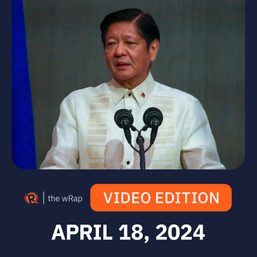
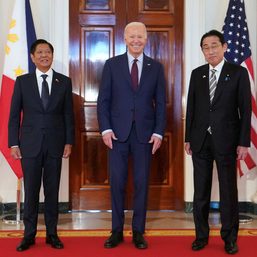

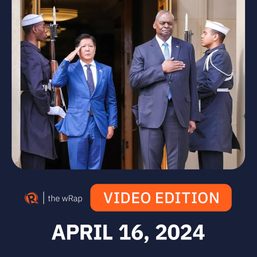
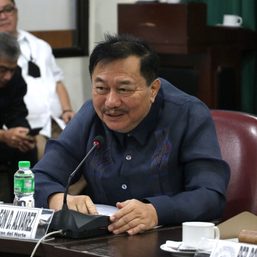
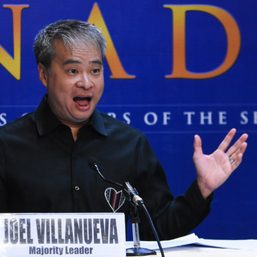
There are no comments yet. Add your comment to start the conversation.